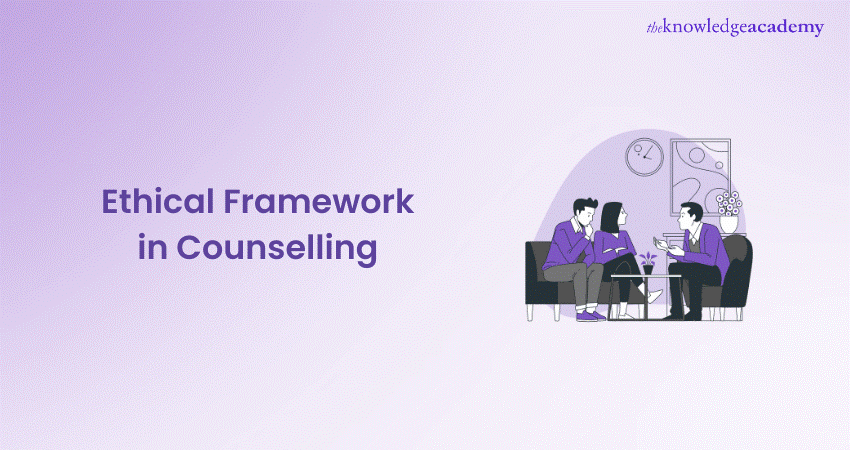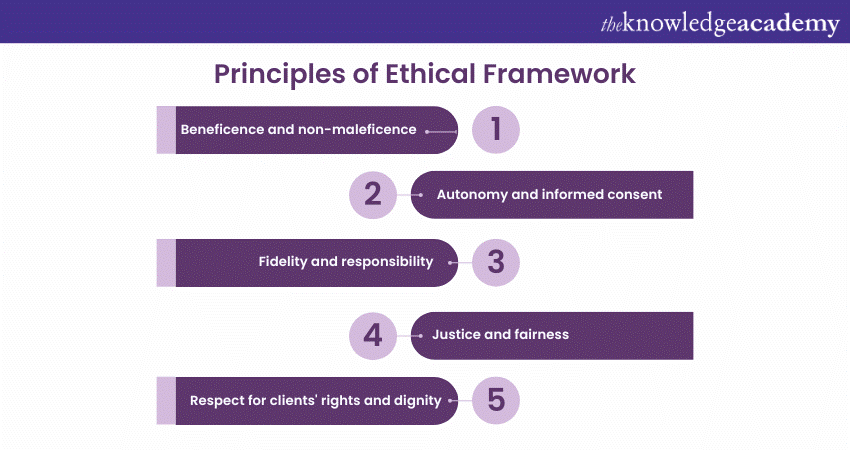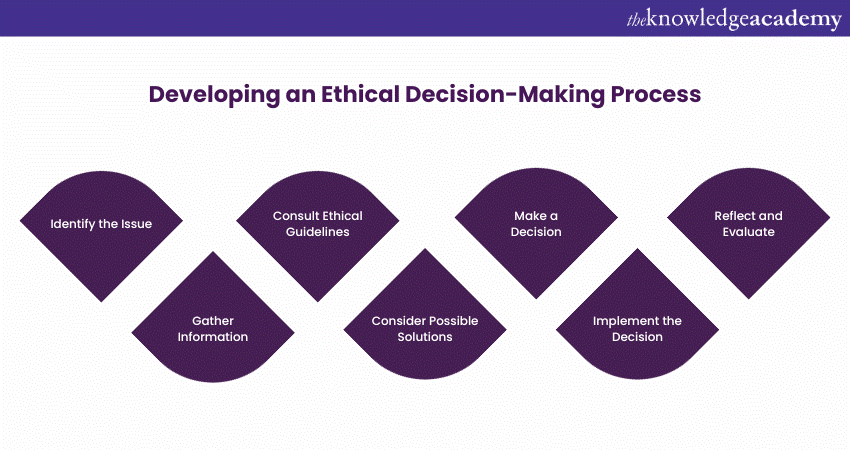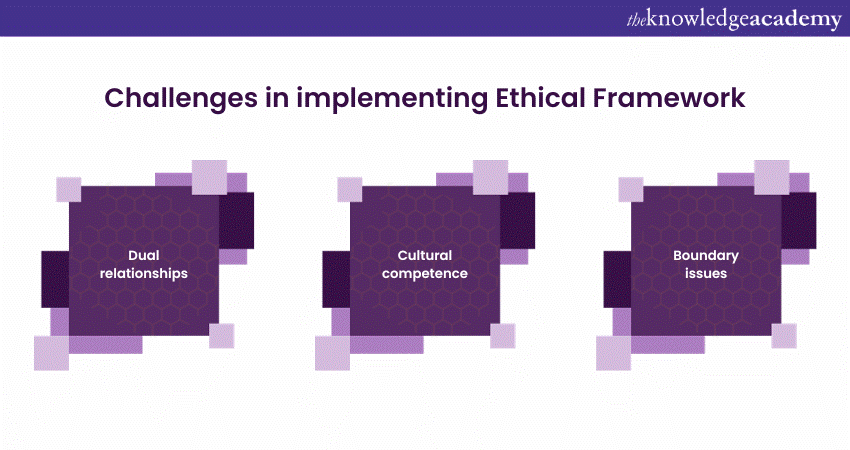We may not have the course you’re looking for. If you enquire or give us a call on 01344203999 and speak to our training experts, we may still be able to help with your training requirements.
We ensure quality, budget-alignment, and timely delivery by our expert instructors.

Counselling is a vital support pillar which helps individuals navigate life's challenges and fosters personal growth. However, with such an intimate and impactful practice comes a great responsibility to adhere to a strong Ethical Framework in Counselling.
Ethical Framework in Counselling is a set of moral guidelines that help Counsellors maintain integrity, make informed decisions, and more.
It also ensures that clients receive the best care while safeguarding their rights and privacy. So, if you are a professional engaged in Counselling, it’s crucial to understand and adhere to these ethics.
Don't know what this framework entails and how it can help in Counselling? Read this blog on Ethical Framework in Counselling to understand the principles and processes that you need to maintain during Counselling.
Table of Contents
1) What is an Ethical Framework in Counselling?
2) Core Principles of Ethical Framework in Counselling
3) Steps to Build an Ethical Framework in Counselling
4) Developing an Ethical Decision-making Process
5) Challenges in Implementing Ethical Framework
6) Conclusion
What Is an Ethical Framework in Counselling?
Ethical Framework in Counselling is a set of moral guidelines that help Counsellors maintain integrity, make informed decisions, and prioritise clients' well-being. They establish a foundation for navigating complex situations, fostering transparency, trust, and professionalism in therapeutic relationships.
Ethical Framework is essential for upholding professional standards and ensuring ethical practices in Counselling. This promotes positive outcomes for clients and fosters a strong client-counsellor bond. Moreover, clients benefit from a safe and supportive environment where they can explore their emotions and thoughts freely.
Why are Ethical Frameworks Required in Counselling?
Ethical Frameworks are very much essential to both Counsellors and the clients. Here are some reasons highlighting why:
a) Client Safety: To maintain the client's safety and welfare, the Ethical Framework binds the Counsellors by ethical codes and helps them provide efficient and impartial Counselling to the clients.
b) Confidentiality: This Framework also ensures that the client’s personal matters remain confidential. It also allows the Counsellors to project trust towards their clients so that they can share any sensitive information which can be crucial for their mental health.
c) Professional Integrity: It helps the Counsellors maintain their professional integrity. The relationship between a client and a Counsellor is a professional one. These Frameworks guide both parties to maintain those boundaries for efficient Counselling sessions.
d) Informed Consent: The Framework lays the foundation to keep client's information safe. They provide a client with the authority to share information with their Counsellor. It also helps them know the nature of the therapy and Counselling sessions they are about to receive.
e) Cultural Respect: The Ethical Framework helps Counsellors remember and respect the cultural views of their clients. This prevents them from discriminating against any client regarding their ethnicity or their unique cultural background.
f) Accountability: Counsellors need to take proper accountability for their Counselling sessions. However, if not adhered to properly, the Framework allows Clients to raise complaints or grievances if they have been mistreated in any way. Similarly, Counsellors may also take necessary actions if the clients do not maintain a professional code of conduct.
g) Continuous Development: Counsellors can continue their professional development with the Framework in place. They help them remain informed on any change or update themselves on any ethical code that they need to follow to give the best Counselling sessions to their clients.
Core Principles of Ethical Framework in Counselling
The Ethical Framework in Counselling is built upon essential principles that guide Counsellors in their professional practice. These core principles serve as a compass, ensuring that Counsellors uphold the highest ethical standards and prioritise the well-being of their clients. Let's explore these principles in detail:

Beneficence and Non-maleficence
The principle of beneficence requires Counsellors to promote their clients' well-being actively. They must strive to enhance their clients' mental and emotional health. They must also work towards positive outcomes in therapy.
Equally important is the principle of non-maleficence, which emphasises the need to avoid causing harm to clients, a key aspect of Counselling Skills. Counsellors must be cautious about their actions and decisions, ensuring they do not exploit vulnerabilities or act in ways that may harm their clients' well-being.
Autonomy and Informed Consent
Respecting clients' autonomy is a fundamental aspect of Counselling ethics. Clients have the right to make their own decisions regarding their treatment and life choices. Counsellors should empower clients to make informed decisions. To do so, they must provide the clients with all relevant information about the Counselling process, potential risks, and benefits. This informed consent process enables clients to participate in their therapeutic journey actively and gives them a sense of control over their own lives.
Fidelity and Responsibility
Fidelity refers to the faithfulness and loyalty that Counsellors must demonstrate towards their clients. They should adhere to professional commitments, maintaining the trust that clients place in them.
Responsibility goes hand in hand with fidelity, as Counsellors must diligently recognise and fulfil their professional duties. It involves being accountable for their actions and taking ownership of their role in the Counselling relationship.
Justice and Fairness
Counsellors must treat all clients with fairness, impartiality, and equality. They should be mindful of their biases during Counselling. They should avoid any form of discrimination or unfair treatment based on one's race, ethnicity, gender, religion, or socioeconomic status. Upholding justice and fairness ensures that every client receives the same level of respect and care.
Respect for Clients' Rights and Dignity
The client's rights and dignity must be respected and protected at all times. Counsellors should uphold the privacy and confidentiality of client information. They should share it only with appropriate consent or when legally mandated to do so. Respecting clients' rights means treating them with dignity, empathy, and sensitivity. This creates a therapeutic environment that fosters trust and safety.
Learn to find acceptance and respect with our Counselling Course - join today!
Steps to Build an Ethical Framework in Counselling
Ethical Framework in Counselling helps maintain the standards and values while conducting Counselling sessions. But, given the versatility of human nature, a standardised Framework may not fit every shoe. Thus, follow these steps to build an Ethical Framework:
a) Ethical Foundations: Firstly, understand the building blocks of ethics based on your country or respective Counselling association. Be aware of the fundamental guidelines and principles that you can implement in your Framework, so as not to violate any standards.
b) Core Principles: Ensure that the core ethical principles in the Framework are in place. These principles are: Do no harm, do good for the client, treat all patients equally and respect clients' choices, decisions and cultural backgrounds.
c) Confidentiality: Maintain professional relationships with clients and protect their personal pieces of information.
d) Cultural Awareness: Familiarise yourself with the culture of the place and make note of the cultural diversity. This will help you not to discriminate against clients knowingly or unknowingly. It will also help you to take the appropriate therapeutic measures so that you can provide service, all the while maintaining their dignity.
e) Professional Boundaries: Establish boundaries; since you are going to be constantly in touch with the clients, you need to maintain professional boundaries so that any personal agendas do not interfere with the treatments.
f) Informed Consent: Always create space in your Framework where you can get informed consent from the clients. This will help you to make the treatment process a lot smoother. This informed consent Framework will give autonomy to the clients regarding the information they want to provide, choices, decisions and even treatments that they want to incorporate into Counselling.
g) Peer Support: Whenever faced with any kind of ethical dilemma, it is suggested that you seek help from your peers or supervisors. This will prevent you from making any hasty, unethical decision.
h) Ethical Awareness: Ensure that you are aware of the ethical decisions that you make in your sessions. However, there may be instances where you might not be familiar with the new ethical guidelines. Hence, you should always ask your colleagues or your peers about the new guidelines to make proper ethical decisions.
Learn how to develop personal care plans with our Introduction to Psychology of Personality Course - register today!
Developing an Ethical Decision-making Process
Ethical decision-making is a critical skill in Counselling that Counsellors must master to navigate challenging situations and dilemmas effectively. Having a well-defined ethical decision-making process is instrumental in guiding Counsellors through complex scenarios. Here's a step-by-step guide to developing such a process:

1) Identify the Issue: Recognise the ethical dilemma at hand during Counselling. It includes understanding potential conflicts between ethical principles and the best outcome for the client.
2) Gather Information: Obtain relevant data and insights to understand the situation comprehensively. It includes consulting colleagues, ethical codes, or supervisors when necessary.
3) Consult Ethical Guidelines: Refer to established Ethical Counselling guidelines from professional Counselling organisations to gain valuable insights and guidance.
4) Consider Possible Solutions: Generate a list of potential solutions and assess their alignment with ethical principles and the client's best interests.
5) Make a Decision: Based on the examination of potential Counselling solutions, select the most appropriate course of action. While doing so, prioritises the client's well-being and adheres to ethical standards.
6) Implement the Decision: Act on the chosen Counselling solution, ensuring the client's welfare and autonomy remains paramount.
7) Reflect and Evaluate: After implementing the decision, engage in self-reflection and evaluate the outcomes. Also, assess the effectiveness of the chosen course of action.
Keen on getting a deeper knowledge about counseelling, refer to our blog on Counselling vs Therapy
Challenges in Implementing Ethical Framework
While Ethical Framework in Counselling serves as an invaluable tool, Counsellors may encounter challenges when putting them into practice. Some common challenges include the following:

1) Dual Relationships: Counsellors must exercise caution in navigating dual relationships with clients. They shouldn’t hold multiple roles, such as being their therapist and employer or therapist and friend. These Counselling situations can compromise objectivity and the therapeutic relationship. As a result, it can hinder the client's progress and well-being.
2) Cultural Competence: Understanding and respecting diverse cultural backgrounds is essential for Counsellors. Lack of cultural competence during Counselling can lead to misunderstandings and unintentional harm to clients. Without proper sensitivity and awareness, Counsellors may unknowingly exhibit bias. This may affect the therapeutic alliance and trust.
3) Boundary Issues: Maintaining appropriate professional boundaries is vital to protecting the integrity of the Counselling relationship. Overstepping these boundaries, either by sharing personal information or becoming too emotionally involved, can blur the lines between personal and professional involvement. This breach of boundaries may lead to ethical dilemmas and harm the therapeutic process.
Conclusion
An Ethical Framework in Counselling is the backbone of the Counselling profession. It provides Counsellors with ethical guidelines to navigate complex dilemmas. Upholding these principles ensures clients' well-being and trust. It also fosters a safe and transformative therapeutic experience.
Understand mental disorders and their effects on people with our Psychology Course – Join now!
Frequently Asked Questions
What are Ethical Boundaries in Counselling?

Ethical boundaries in counselling establish the limits of the therapist-client dynamic. They maintain professionalism, confidentiality, and respect while avoiding conflicts of interest and misconduct.
Why is an Ethical Framework Important in Counselling?

An Ethical Framework in Counselling is crucial for safeguarding clients' rights, building trust, and ensuring safe, effective therapy in a structured environment.
What are the Other Resources and Offers Provided by The Knowledge Academy?

The Knowledge Academy takes global learning to new heights, offering over 3,000 online courses across 490+ locations in 190+ countries. This expansive reach ensures accessibility and convenience for learners worldwide.
Alongside our diverse Online Course Catalogue, encompassing 19 major categories, we go the extra mile by providing a plethora of free educational Online Resources like News updates, Blogs, videos, webinars, and interview questions. Tailoring learning experiences further, professionals can maximise value with customisable Course Bundles of TKA.
What is The Knowledge Pass, and How Does it Work?

The Knowledge Academy’s Knowledge Pass, a prepaid voucher, adds another layer of flexibility, allowing course bookings over a 12-month period. Join us on a journey where education knows no bounds.
What are the Related Courses and Blogs Provided by The Knowledge Academy?

The Knowledge Academy offers various Mental Health Courses, including the Mental Health and Wellbeing Training, Counselling Course, and Psychology Course. These courses cater to different skill levels, providing comprehensive insights into Wellbeing at Work.
Our Health & Safety Blogs cover a range of topics related to Mental Health, offering valuable resources, best practices, and industry insights. Whether you are a beginner or looking to advance your Health & Safety skills, The Knowledge Academy's diverse courses and informative blogs have got you covered.
Upcoming Health & Safety Resources Batches & Dates
Date
 Counselling Masterclass
Counselling Masterclass
Fri 4th Apr 2025
Fri 6th Jun 2025
Fri 8th Aug 2025
Fri 3rd Oct 2025
Fri 5th Dec 2025






 Top Rated Course
Top Rated Course



 If you wish to make any changes to your course, please
If you wish to make any changes to your course, please


